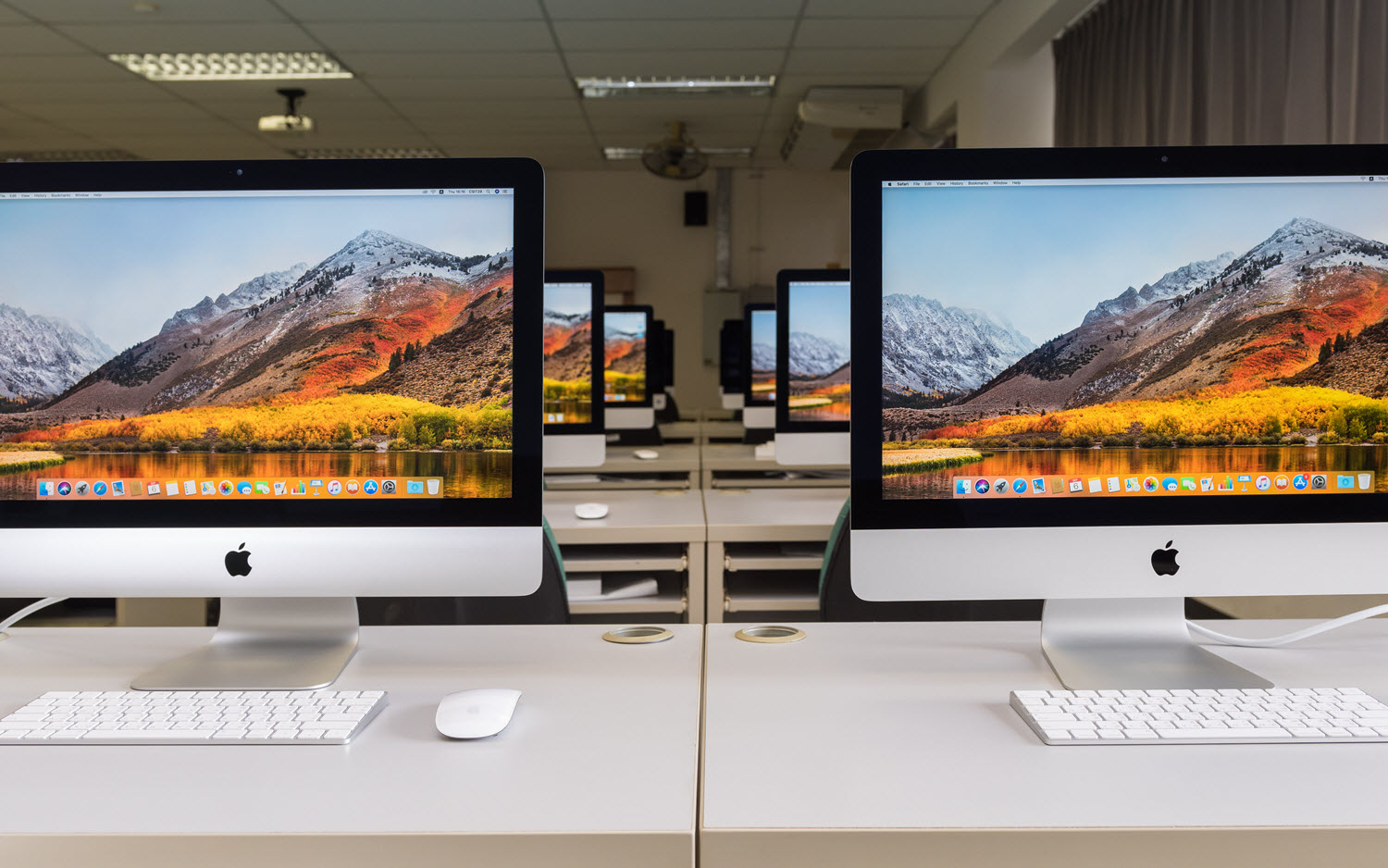If Your Company Runs on PCs, Should Anyone Get a Mac?
Picture this: you’re manning the help desk, minding your own business and you get a message from a coworker whose computer has finally bitten the dust after many years of service. It’s no problem. That machine was at the end of its life, and you can order the employee a similar unit as a replacement. But then you look closer. Their email ends with, “Do you think I could get a MacBook as a replacement?” The horror.
Many companies rely on PCs as their daily office workhorses. They’re durable, customizable and, most importantly, manageable. An IT department that manages the company network and an army of PCs relies on a smooth operation to keep the office running as it should with minimal hiccups. Do Macs throw a huge wrench in this operation? And if an employee wants a MacBook, should you make an exception?
Macs In a PC World
For an IT department that manages an office full of PCs, a MacBook can be a regular and ongoing nuisance. Getting Macs to cooperate in a Windows environment compounds the work expected of an IT staff.
Having even one or two Macs in a Windows-based office “just does not work wonderfully," K. Thurman, a Systems Administrator for managed and cloud services provider Ntiva, tells Tom's Hardware.
"When it comes to management, PCs are much more friendly. Macs do not cooperate with the domain as much. They have trouble connecting to network share drives. Especially since many servers are Linux-based, Macs are out of the server game," he says.
From the perspective of a staff that needs to manage and maintain a company server, which would be most compatible with PCs, it’s as if Macs need additional babysitting. A Linux server will not play well with the Apple outliers.
“In an established Windows domain, trying to use a Mac in that environment is not very friendly … with a Mac you have to manually bind with the IP when dealing with servers,' Thurman says.
Get Tom's Hardware's best news and in-depth reviews, straight to your inbox.
So if you want to access company files, manage user accounts, set proxy server preferences, attach network drives et cetera, a MacBook would need extra IT attention to manually set that all up, whereas a PC setup would be painless.
MacBooks are already a pain to manage when they’re working perfectly. But what happens when you need to make repairs on that Mac? Or even do regular maintenance on office computers?
Nightmare Repair
Apple infamously keeps their computer components close to the vest. In an effort to keep Apple tech from the open market, only they or an authorized party can obtain Mac parts to perform repairs. This past April, as a result of Apple’s repair policies, a YouTube channel called Linus Tech Tips (manned by Linus Sebastian and his team) began a multi-month journey into computer hell.
Because Sebastian opened an iMac Pro, which broke, he could not get it serviced by Apple and had to turn to a third-party provider, which had to obtain the parts through other means. It was expensive and took over three months. Clearly, if you're running a business, you need to be able to get service more quickly.
Computers Need Service
IT departments can easily manage the repair or maintenance of PCs for which you can actually buy parts. But you can’t even open a MacBook up to clean out dust without voiding your Apple warranty. Then, why would an IT department want to introduce Macs into a PC work environment that they continuously maintain when they can’t even do sufficient work on them? Well, apparently they can.
According to Jim Harryman, Founder and CEO of Kinetic Technology Group, an MSP, there’s an option that circumvents the need for Apple or third-party providers.
"Apple actually has a program for IT departments where they can get certified and get parts directly from Apple," he explains. "So a company has to say, ‘We’re bringing in more Macs to manage, so who is going to step up and learn about that?’”
So, it’s not totally impossible for IT to learn how to service Macs in the way they would PC’s if your company wants to take on that training upfront.
But if IT does have to go to Apple for repair, it’s still at least a multi-week process for Apple to source all of the parts from their one supplier (itself), fix your computer and send it back to you.
"So if you’re trying to do your job, you can’t wait months for repair; and you can’t just replace it, it’s a multi-thousand-dollar workstation,” notes Ntiva's Thurman.
However, with so much data in the cloud, it's possible that you could just give the employee another Mac (or PC) while the first one is being serviced.
Does Anyone Get an Exception?
Despite all of these reasons for PCs being the easiest choice for an office fleet, you may still be met with employees who wonder if they can have a Mac instead of a PC.
When asked if any employee should be granted a Mac that goes against a PC standard, Thurman answers: “My opinion is to not give them an exception; there’s just no reason for it. If you want to use a Mac at home as your own workstation, that’s great. But they just don’t play well in a corporate environment.”
Thurman goes on to give an example: “Let’s say there is an individual who uses the one Mac in the workplace because he likes them and he’s used them his whole life. I’d end up doing some work on his computer once a month. Whether it’s connecting to printers, file servers, anything in the Windows-based network, something always goes wrong.”
Valid points. The rise of MacBooks and iMacs as corporate workstations, however, speaks to some degree of acceptance of these obstacles. Harryman provides another viewpoint, saying IT resistance to an increase in workload (and therefore cost) could all come out in the wash.
“I work with lots of enterprise IT environments where Windows and Mac coexist on a daily basis in a productive fashion and at no real larger expense- it may be a larger expense on the IT side, but if you look at it, companies are seeing greater productivity in the areas of the business that make money as opposed to those that cost money," he says. Maybe that increase in IT management is an investment.
This raises the question of whether employees do better work when they have the computer they like to use. If that MacBook request comes in, maybe the employee could be looking to improve their work.
“I’ve worked with companies that switched certain roles to Macs, and people in those specific roles were generally happier and got work done in a much more productive fashion," Harryman says.
Additionally, in the grand scheme of things, Macs are a popular choice for design departments and employees that work in the visual realm (like photo and video editors).
“Any of the more creative trades would prefer to work on Macs and really should be allowed to because then they would be more productive,” Harryman says.
So, there’s a good argument for an exemption for those types of employees. And, of course, if any C-level executive wants a MacBook, then they should probably get one.
Bottom Line
When your office is filled with PCs, a Mac can feel like a flat tire. It needs extra attention to keep it effectively running on the company network and can bog down IT staff. But working through these obstacles can potentially help your company run more efficiently. It’s not impossible for Mac and Windows to coexist, but introducing Macs into a PC-centric workplace can potentially increase your IT needs. When the question of a Mac exemption pops up, look at the big picture of how it could affect productivity as a whole.
-
stdragon OSX has some unresolved issues involving stability and performance accessing an SMB share from a Windows file server. So go ahead and use a Mac, just don't complain about it within a Windows environment. If you insist, run Windows as a VM.Reply -
gburke We are 150 PC users but the few who want to use Macs have their own and either VM or have both PC and Mac. Their PC sits on the desk in the corner... just in case. : )Reply -
AnimeMania Would your company be in any legal trouble if you gave your employees Hackintoshes? You legally purchase the Mac OS and software, but don't run it on Apple computers.Reply -
stdragon Hackintosh systems I'm sure violate the OSX license agreement. At the very least, the OS is non-supported in that hardware setup. Either way, no respectable IT dept would ever allow such an abomination to be used in production as it's inherently unreliable.Reply -
johnnyts 6 years ago if someone told me that wants to "integrate" Macs on the company network my answer would be, "Are you nuts?". But, having worked at a company of a couple of thousands of workstations, I want to say that in the year 2018, we are more flexible and the management is easier and simpler for our iMacs instead for the Windows 10 machines. (Win7 is a different story, they are still good).Reply
All these macs are working at the domain, have restrictions, policies etc. just like the Windows machines.
At this time it is easier to push settings and applications to macs than Win10 pcs.
I am not comparing the cost of the workstation, since you can get a PC for 500euros+150 for a monitor for office work, and the cheapest iMac is at 1000. Win10 has a long way to go until they are usable like their predecessors on a company environment, and I am starting to losing hope. -
Dosflores Reply21321701 said:Would your company be in any legal trouble if you gave your employees Hackintoshes? You legally purchase the Mac OS and software, but don't run it on Apple computers.
You can't legally purchase macOS. You can only legally purchase a Mac, which is licensed to use macOS. Hackinstoshes are illegal.
-
The Paladin things to consider....why mac has never truly been on the industrial scene;Reply
1) Training; the number of people that have use a pc for a decade at work, and you would slap a Mac under their nose, you would find a huge drop in productivity as people ( the large majority of users in the workforce) have never seen, never mind used a mac for work.
2) Security; buying mac to run windows in a vm is funny, if that is your purpose for security reason, then why no step up to the next generation industry systems instead of buying expensive mac desktops; Virtual servers running desktops for users, and run dummy terminals (minimal workstations) on the desk. cheap, safer and far more controlling than either having a mac or pc on a desk. (and yes I see this being implemented in Schools and companies more and more, why? cheaper and far more secure than a desktop of any kind)
3) Price; Mac is twice or trice the price of a PC for a work environment at best, 99% of user have zero need for the power and capabilities of a mac over a workstation desktop pc, if mac made a "workstation desktop" that competes with the dell and Hp of the industrial world, then I says why no.
4) software; why buy a mac? my company already has 1000 license of MS office for pc, they will not convert those into 1000 Mac office licenses, so aside the price of the mac desktop I also have to consider buying more windows license to run software I have to convert to mac software licenses double my costs for my office.
Note; in my arguments above I am not speaking about an office starting from 0. then argument 1 & 4 could be mitigate by hiring mac lovers/users and purchase of mac software to begin with.
Personal note; and this will pass as judgmental, but is truly a fact, I have been around mac and pc for last 30 years, and in the last 10 years the more I have to interact with mac "companies" the more I find the "mac" users to be hipsters that think they know everything about their macs, compared to the pc users that at time painfully admits their barely know how to use a mouse.
The truth is neither know anything about their personal computer, but the Mac user will try their best to tell you what to do on their mac when your better qualified than they are to fix the issue.
I, as a professional traveling technician, covering 10 states, and about 3500 companies, have no issue having someone using a mac for their corp, but have serious reservations in my interactions with their IT and user, that always blame professional software and hardware and have problems understanding the relationship with drivers and lack of support most mac drivers have from cops that make the hardware ,why is that?, it is because mac computers is less than 1% of the industry standard systems, and not worth millions of dollars investments by most corps.
This sad fact; it is not a fight against mac's, it is because apple still in this day an age force companies to jump through so many hoops to produce hardware and drivers for the mac that it is too much work than produce drivers for a windows based system. This has been the issue with apple hipster mentality from the start and why IBM and other PC based companies have taken over the industry.
Mac best purpose is graphical and photography, without a doubt always have been and always will be the better computer for advertising and printing shops designers etc... you can have a mix of a few Mac inside a corporation of 1000's of desktop workstation using office. -
gdmaclew This would never happen where I work.Reply
The computers are purchased by the company for use by employees.
This is done for consistency and security.
If an employee came to me (IT dept) and asked if they could replace a broken PC with a MAC the answer would be a resounding NO.
-
redgarl No reason to have Macs.... period. There is absolutely no reasons. Except brand loyalty...Reply


